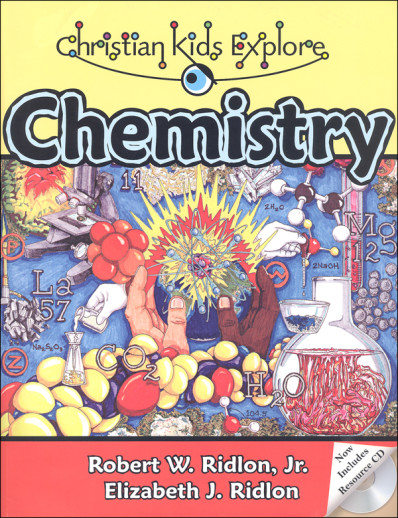We use cookies to make your experience better. To comply with the new e-Privacy directive, we need to ask for your consent to set the cookies. Learn more.
Christian Kids Explore Chemistry
This volume consists of 30 lessons divided into 5 units: "Basics of Chemistry," "Atoms and Molecules," "The Nature of Chemistry," "States of Matter," and "Organic Chemistry." Unlike Biology and Earth & Space, this volume was authored by husband-and-wife team Robert W. and Elizabeth J. Ridlon.
Give your students a thoroughly Christian introduction to the underlying principles of matter with Christian Kids Explore Chemistry. Featuring conversational, accessible lessons that can be used with students in multiple grades, this easy-to-use homeschool curriculum will get everyone involved in science. Lessons focus on the basics of chemistry (including matter, measuring, elements, molecules, and compounds) as well as concepts such as bases and acids, states of matter, biochemistry, and more. Units begin with a short introduction that provides objectives, vocabulary, and materials needed; a coloring page and a unit "wrap-up" multiple-choice assessment are also included. This book features 30 lessons, each designed to take approximately one week. One-year curriculum.
Grades 4-8, though some activities for younger students have been included. Answer key provided; fully reproduced questions with bolded correct answers. Extensive book and resource list with appropriate grade levels also included. 356 indexed pages, softcover. Reproducible consumable workbook. Reproduction allowed for families.
Discover God's majesty—from a single molecule to an entire universe! Embark on a lifelong quest to know God through His creation with our award-winning series, Christian Kids Explore Science.
Worried that science just isn't your strongest subject? We understand, and we designed this curriculum with you in mind! As the teacher, you'll find each book in the Christian Kids Explore series both accessible and intriguing, regardless of your prior science background. Your students will learn to observe, question, and explore our world. Are you ready to plant a true thirst for discovery?
Items listed in this section tend to be complete science programs with a teacher and student component, requiring few supplements besides science supplies.
By identifying a need in her own homeschool and filling it, homeschool mom Stephanie Redmond has constructed a user-friendly, biblically-based science program that you can easily use with multiple levels of children at once. Each volume includes lessons to read, hands-on activity instructions, unit reviews, lists of suggested supplemental resources, and more. While you will probably locate some supplemental resources, the bulk of what you need is contained in just one book, which keeps things simple (no searching the house for misplaced workbooks or activity books!). Volumes are broken down into 24-35 lessons organized into units. While the number of units varies per book, you can plan on completing the course in one year (or less) if you take the author's suggestion and complete one lesson per week. Most instructors divide the lesson up into two 60 to 90-minute sessions – one for reading and one for activities.
The first portion of the lesson contains the instructional text which can be read aloud, or read independently by older students. Although intended to introduce and explain science concepts, the text is conversational and well-written. Lesson vocabulary definitions, related scriptures, and science facts appear in the margins, and several questions follow the reading for either discussion or a short quiz. If time and interest permit, you will probably want to supplement the lesson reading with library books or other resources. You'll appreciate the author's extensive resource lists in each book's appendix which offer ample suggestions. In Biology, the author recommends these activities for the "reading" part of the lesson: making and reviewing unit vocabulary flashcards, reviewing the main topic(s) of the previous lesson, reading the current lesson, memorizing the vocabulary for the current lesson, and spending any remaining time reading from supplemental sources.
The second half of the lesson is the activity portion. There is quite a variety to these, and they relate very well to the lesson content covered in the reading. Each activity includes an objective, a materials list, and step-by-step instructions. Occasionally, a simpler activity for younger students is included if the main activity is likely to "go over their heads." Rather than answering questions following the activity, students are usually directed to fill out the provided "Checking It Out" form, which is like a lab activity guide. They'll record the objective, hypothesis, procedure, results observed, and what they learned. Examples of activities found throughout the series are: building a terrarium (Biology), making an edible sedimentary rock (Earth & Space Science), finding household products that contain strong bases (Chemistry), calculating bicycle wheel speed (Physics), or making a fossil (Creation Science).
You'll find everything else you'll need either in the unit introduction, in the appendix, or in the downloadable digital resources. Units begin with a list of vocabulary covered, a comprehensive materials list, and any other information you'll need to cover the unit. A multiple-choice "Unit Wrap-Up" is provided at the end of each unit for review. Appendices with reference lists, answer keys, and a glossary are included at the end of each volume. Each book also includes a digital download code inside the front cover. This downloadable resource includes: daily lesson plans, reproducibles (experiment forms, maps, memory lists, coloring pages, field trip journal forms and more), materials lists and a bonus literature study guide. ~ Jess
| Product Format: | Kit |
|---|---|
| Brand: | Bright Ideas |
| Author: | Robert W. Ridlon, Jr. |
| Grades: | 4-8 |
| ISBN: | 9781892427229 |
| Length in Inches: | 11 |
| Width in Inches: | 8.5 |
| Height in Inches: | 0.75 |
| Weight in Pounds: | 2.05 |

